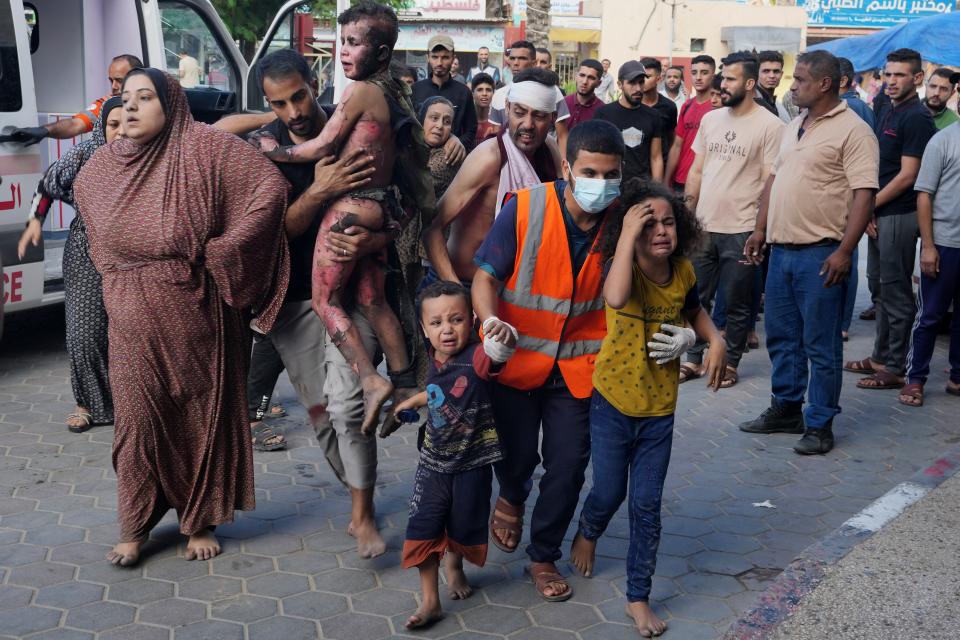Israel-Hamas war will leave a generation in trauma. Will the world forget its children?
On Oct. 7, Hamas, an Islamic political terrorist group, launched a coordinated attack on southern Israel, killing hundreds of people, including civilians and children, and taking many hostage. In the days that followed, Israeli Prime Minister Benjamin Netanyahu vowed “mighty vengeance” and retaliated with airstrikes, dropping 6,000 bombs in Gaza – a densely populated Palestinian territory located on the eastern coast of the Mediterranean Sea – also killing hundreds of people, mostly civilians and children.
Israeli Defense Minister Yoav Gallant has since ordered a “complete siege” on Gaza, instating a total blockade of essential supplies like electricity, food, water and fuel. UNRWA, a United Nations relief agency that works with Palestinian refugees, reports that nearly half of Gaza’s population of 2.3 million has been displaced over the past weeks, with masses of Gazans fleeing their homeland in the face of an imminent Israeli ground invasion. The result? A humanitarian crisis riddled with death and bloodshed.
Gaza has been in lockdown for more than 15 years in what the Human Rights Watch Israel and Palestine director, Omar Shakir, calls a resource-starved, overpopulated “open-air prison.”
I’m not Palestinian, nor am I Israeli. Religiously, I do not follow Islam or Judaism. I am well aware that I can’t speak from the context of a lived experience. I don’t know what that would be like. However, as someone with a public policy background, what I do know is that we’ve made a mockery of human rights and international protections.
This is what happens when we no longer view people as human beings but rather as expendable pawns in a larger political narrative – when we value power over people instead of people over power. When we value land more than lives. Furthermore, this is what happens when we forget about one of the world’s most vulnerable populations: children.

In war, children suffer the most
About half of Gaza’s population are children, a large portion of which are under 14 years old.
A 2022 report by Save the Children, an international nongovernmental organization, found that life under constant blockade has left 80% of children in Gaza struggling with depression, grief and fear with mental health and well-being of children declining significantly since 2018. Tragically, more than half of Gaza’s children experience suicidal ideation, with 3 out of 5 engaging in self-harm.
Some have spent their entire lives confined to a strip of land that’s 140 square miles, or the size of two Washington, D.C.s, and have lived through multiple wars with no hope of ever seeing a world beyond.
In war, it is children who suffer the most. Yet, their voices – their livelihoods – tend to matter the least. This oversight extends even beyond the Gaza Strip. On Oct. 15, a 6-year-old Palestinian American boy, Wadea Al-Fayoume, was fatally stabbed at least 26 times in his home outside Chicago by his 71-year-old white landlord in what police say was a hate crime.
'Take a lesson from the dead': Fatal stabbing of 6-year-old serves warning to divided US
The landlord became obsessed with news of the war and screamed, “You Muslims must die,” according to the Chicago office of the Council on American-Islamic Relations, citing texts between Wadea's parents.
As jarring as this is, the message is crystal clear – only one group “deserves” to live while the other is to be considered subhuman, or less worthy.
Rhetoric – and misinformation – can be lethal
Rhetoric can be lethal. Hate crimes against the Jewish, Muslim and Arab populations are on the rise in the United States. Unverified information is more likely to spread like wildfire on social media, especially around breaking news, and any effort to retract statements may not reach the same audiences.
Therefore, it is essential that media organizations provide unbiased coverage of world events to accurately shape public opinion – especially because the language employed by journalists, academics and writers is used to train algorithms that run generative artificial intelligence tools such as ChatGPT.
We survived Hamas attack. What's now happening in Gaza haunts our interfaith group.
The responsibility to enforce human rights rests on governments themselves; they must be held publicly accountable. Democracies around the world are becoming increasingly authoritarian in the absence of checks and balances. Our silence is what’s allowing them to operate with such infidelity.
Erika Guevara-Rosas, a senior director of Amnesty International, said last weekend's communications blackout in Gaza – which lasted about 34 hours – made it "even more difficult to obtain critical information and evidence about human rights violations and war crimes being committed against Palestinian civilians in Gaza."
More than 3,450 children have been killed in the Gaza Strip since the start of the war, UNICEF spokesperson James Elder said Tuesday. Due to water shortage, infant and child deaths from dehydration also are a growing threat.
It is our job, as a society, to keep children safe. This is a job that we’ve failed time and time again.
The number of children killed in Gaza during these three weeks is more than the number killed in armed conflicts globally, over the course of a year, for the past three years. Policymakers, government officials, prominent figures and celebrities are largely remaining silent due to the threat of public and professional retribution in a time where, more than ever, raising awareness is imperative. Calls for a cease-fire could allow for emergency aid and lifesaving supplies to support children in need until a more permanent solution is uncovered.
Opinion alerts: Get columns from your favorite columnists + expert analysis on top issues, delivered straight to your device through the USA TODAY app. Don't have the app? Download it for free from your app store.
Parents in Gaza are writing the names of their children on various parts of their bodies in case they get lost or, more likely, killed. I never thought this was a sentence I’d read and I refuse to become desensitized to tragedy.
We must acknowledge that, indeed, there’s a palpable heaviness in the world right now. It’s fueled by our shared grief and collective pain. It metastasizes through propaganda and misinformation, and is spurred on by a lack of empathy or compassion. Hatred festers in the wake of dehumanization and is amplified by fear.
To achieve peace there must be freedom from oppression. To be free you must have your voices heard and listened to, more than just the voices of adults – children, too. Until then, those who stand by silently can assume culpability in the trauma of generations to come.

Isha Sharma is a first-generation Indian American writer based in Brooklyn, New York. A Case Western Reserve University and Georgetown University graduate, she aims to highlight and advocate for underrepresented voices in mainstream media. Follow her on Instagram: @isha__sharma
You can read diverse opinions from our Board of Contributors and other writers on the Opinion front page, on Twitter @usatodayopinion and in our daily Opinion newsletter. To respond to a column, submit a comment to letters@usatoday.com.
This article originally appeared on USA TODAY: Israel, Hamas war in Gaza leaves kids paying the ultimate price

